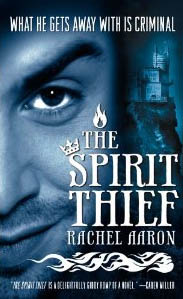 The Spirit Thief by Rachel Aaron is terribly derivative.
The Spirit Thief by Rachel Aaron is terribly derivative.
And therein lies its charm.
Maybe it’s because I’ve been in a massive reading slump, slogging through my pile of library books, finding mild entertainment, but no real joy. But The Spirit Thief, with its unabashed “D&D gaming session put to paper” approach is an awful lot of fun.
The novel’s protagonist, by the author’s own admission, is a D&D character concept. Eli Monpress, the thief protagonist, is cut from the mold of many a TSR novel, as are his companions, Josef, the warrior, and Miranda, the wizard (spiritualist). The only non-archetype is Nico, the demonseed within an ordinary human girl. At least, she doesn’t feel like a fantasy RPG character; more like a goth girl from a vampire novel.
For Eli Monpress, being a thief extraordinaire isn’t enough. Nope, he won’t be satisfied until there is a million dollar gold bounty on his head. To that end, he cooks up a scheme where he will kidnap the King of Mellinor. The king’s ransom will be the modest sum of 5,000 gold and a promise that Mellinor will pledge an additional 35-thousand to Eli’s bounty.
The plan goes awry–well, of course it does–when the king’s exiled (and embittered) older brother shows up. The brother, Renaud, was exiled because he is a magic user and wizards, even royal wizards, aren’t allowed in Mellinor. The kidnapping of his younger brother is the perfect opportunity for Renaud to reclaim what is his.
Meanwhile, Miranda, a spiritualist, arrives in Mellinor, acting on order of the Spirit Court to apprehend Eli. Eli isn’t just a thief. He’s also a wizard, able wield spirit magic. In the world of The Spirit Thief, everything, trees, rock, doors, has a spirit, which can communicate with and do the bidding of wizards. In fact, when we first meet Eli, he is chatting away with the door to his prison cell. The Spirit Court objects to Eli’s high-profile hi-jinks; hence, the arrest warrant.
Nice, civilized wizards find ways to gently coerce spirits to help in their endeavors. Enslavers, like Renaud, force spirits into servitude, which drives the spirits insane. Because loony spirits are dangerous, this kind of spirit magic is a no-no, and Miranda is forced to ally with Eli in order to stop Renaud from unleashing big, bad, batshit-crazy spirits on the world.
Eli’s charming, devil-may-care attitude is a cute foil to Miranda’s uptight, duty-bound approach to life. Josef and Nico are mostly along for companion value, but there’s enough character there to make both at least intriguing. With both, a lot of backstory remains a mystery, left, I assume, for later novels.
The novel’s biggest weakness is the almost complete absence of interior dialogue. There’s rarely any sense of what the characters are feeling or thinking. Because the writing is tight and fast paced, I didn’t notice this at first. But given my tendency to start “shipping” characters, I started to wonder what Eli thought of Miranda and vice versa. It isn’t until the very end, that the reader is let into Eli and Miranda’s mind. If the author had done that throughout the novel, The Spirit Thief would have been a keeper.
I’m looking forward to reading the next installment in the series.


